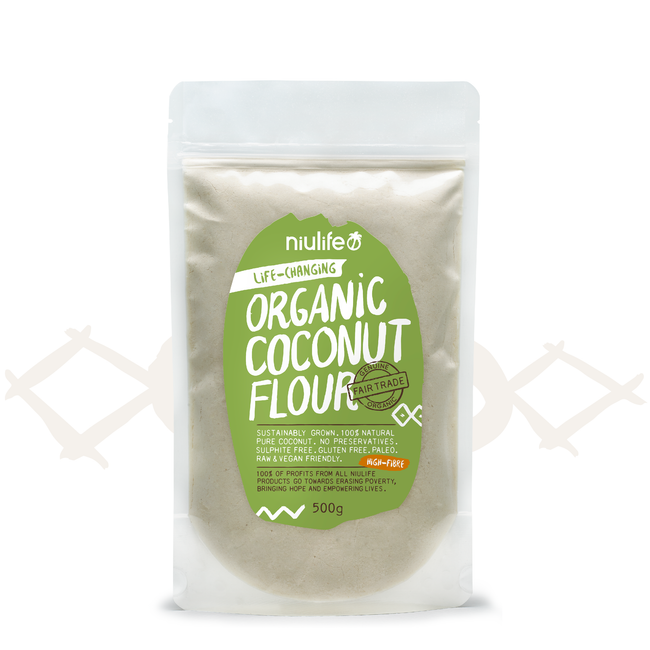
Coconut Flour – The Better Baking Alternative
What is it that makes even the best of us swoon and salivate uncontrollably when we smell fresh bread baking? Are you someone who struts with gritted determination as you approach the hot pie shop to avoid the temptation of joining the swelling crowd who have already weakened in their resolve? I certainly am and it can really do your head in.
It’s so easy to be addicted to all things wheat - cakes, biscuits, pancakes, muffins, pies, pasta, pizza - the list goes on and on. A world without wheat, or I should say without baked wonderfulness, would almost be a world not worth living in. But, today a lot of people are facing that challenge.
There is a hugely growing number of people who are now allergic to wheat or can’t tolerate the gluten found in many grains. Some people are avoiding wheat to cut down on their carbohydrate intake. Whatever the reason, it’s a tough call, until Coconut Flour.
While the food manufacturers have come up with a multitude of wheat alternatives, these are mostly extremely high in starches and carbohydrate, making many who are gluten intolerant gain excessive weight. This is because they have replaced all their goodies with gluten free, high carbohydrate alternatives and perhaps have gone over-board because it no longer makes them feel sick. Instead, this has made them fatter, adding to the western world’s growing health problems of obesity, insulin resistance and diabetes, of which the current statistics are overwhelming.
Usually low carb, gluten free alternatives are very expensive, processed and loaded with flavour enhancers and sweeteners.
Coconut Flour provides the solution: Coconut is naturally low in digestible carbohydrate, contains no gluten, is cheaper than nut flours, loaded with health promoting fibre, important nutrients and tastes delicious. Coconut Flour is made from finely ground coconut meat with most of the moisture and fat removed.
Used much like wheat flour, you can use Coconut Flour to make a multitude of delicious breads, pies, biscuits, cakes, and muffins.
Coconut Flour contains less carbohydrate than soy or nut flours. It contains a whopping 40% fibre, making it the highest fibre flour you can buy. It is also calorie-free compared to other wheat alternatives and provides a good source of protein (20%). More protein than enriched white flour, rye flour or cornmeal and as much as buckwheat and whole wheat flour.
Baked goods using Coconut Flour are light and soft with a wonderful taste and texture. It is safe and regarded as hypoallergenic, meaning very few people are allergic to it. Alternatives to common allergens are often unhealthy and can damage your health due to them being highly processed, such as soy flour.
Coconut Flour provides an alternative to wheat that is inexpensive, high in health-promoting fibre and low in digestible carbohydrate (starch & sugar). Digestible carbohydrates are the ones the body converts into fat and stores. They are the carbs, when eaten in excess, contribute to obesity, insulin resistance and diabetes. These are the carbs you want to avoid. Unlike its evil buddy, non-digestible carbohydrates pass through the digestive tract without being broken down or absorbed, so it passes out of the body practically unaltered and provides the body with good healthy fibre.
When using Coconut Flour, there are few things you need to know. Firstly, while it looks like wheat flour, it behaves quite differently. The two main differences are Coconut Flour is gluten-free, the protein that makes dough elastic allowing it to trap and hold air bubbles giving wheat bread its characteristic light, airy texture. Because of the very high fibre content, it absorbs significantly more liquid than other flours. Therefore, you cannot replace 100% Coconut Flour for Wheat Flour, and generally you need to add a little more water. As a rule, add an equal portion of water/fluid. For example, if you add ½ a cup of Coconut Flour, add ½ a cup of water/fluid as well.
It is also recommended you drink plenty of water when consuming Coconut Flour baked goods.
A few tips when storing and using Coconut Flour. Keep it stored in an airtight container. If left open it will absorb moisture from the air, will form lumps and spoil more rapidly. At room temperature Coconut Flour will stay fresh for several months. Refrigerated it will keep for six months. If unopened it can be frozen for over two years. Coconut Flour has a natural tendency to form clumps, but these break up easily, just sift it into recipes to make mixing easier. Lastly avoid the urge to thicken batter with more Coconut Flour. Better to let it rest for a few minutes and it will thicken as the fibre absorbs moisture.
Thankfully, unlike only a few years ago, there now are many more wonderful and delicious recipes using Coconut Flour as a complete substitute for wheat flour. Will you make the switch?
References:
Cooking with Coconut Flour – Bruce Fife, N.D.



Be a part of their story
#ihaveanewlife #realvillagepeople